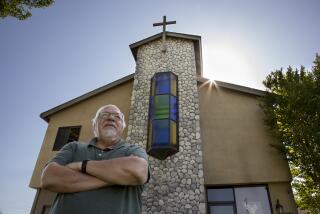White Pentecostal Group Officially OKs Disbanding
- Share via
MEMPHIS, Tenn. — Ending nearly half a century of racial separation, an all-white association of Pentecostal denominations voted Tuesday to disband, taking a historic first step toward reclaiming the multiracial roots of American Pentecostalism.
The unanimous voice vote by 100 leaders of white denominations, including the Assemblies of God, the Pentecostal Holiness Church and the International Church of the Foursquare Gospel, followed several hours of closed-door soul searching and expressions of repentance by both African American and white Pentecostal Christians.
“This is epic,” said Del Tarr, president of the Assemblies of God Theological Seminary in Springfield, Mo.
Bishop Ethiel Clemmons of the predominantly African American Church of God in Christ said the vote marked the first time in this century that top leaders of both white and black Pentecostals have stated a willingness “to examine and probe the primary assumptions” of racism that for so long set Pentecostals apart.
In voting to dismantle the 46-year-old Pentecostal Fellowship of North America, white delegates to an unprecedented biracial conference of Pentecostal Christians cleared the way for the creation of a new multiethnic organization today.
It will be called the Pentecostal Churches of North America, and its membership will be open to the estimated 16 million Pentecostals in the United States. Although no merger of actual denominations is envisioned, backers hope for growing cooperation at the local level between African American and white Pentecostal churches.
Tuesday’s vote came as no surprise. The groundwork was laid over the past three years by B.E. Underwood, general superintendent of the Pentecostal Holiness Church, and by Clemmons. The action was foreshadowed Monday night when an estimated 2,500 delegates burst into a song, “Lord, make us one!”
But even as the racially mixed crowd rejoiced together, some acknowledged Tuesday that hard work lies ahead to steer clear of tokenism in leadership positions and to get the word out to the rank and file.
After the vote, Clemmons said it will take three to five years for the full impact of cooperation to be felt at the local congregational level.
More to Read
Sign up for Essential California
The most important California stories and recommendations in your inbox every morning.
You may occasionally receive promotional content from the Los Angeles Times.













